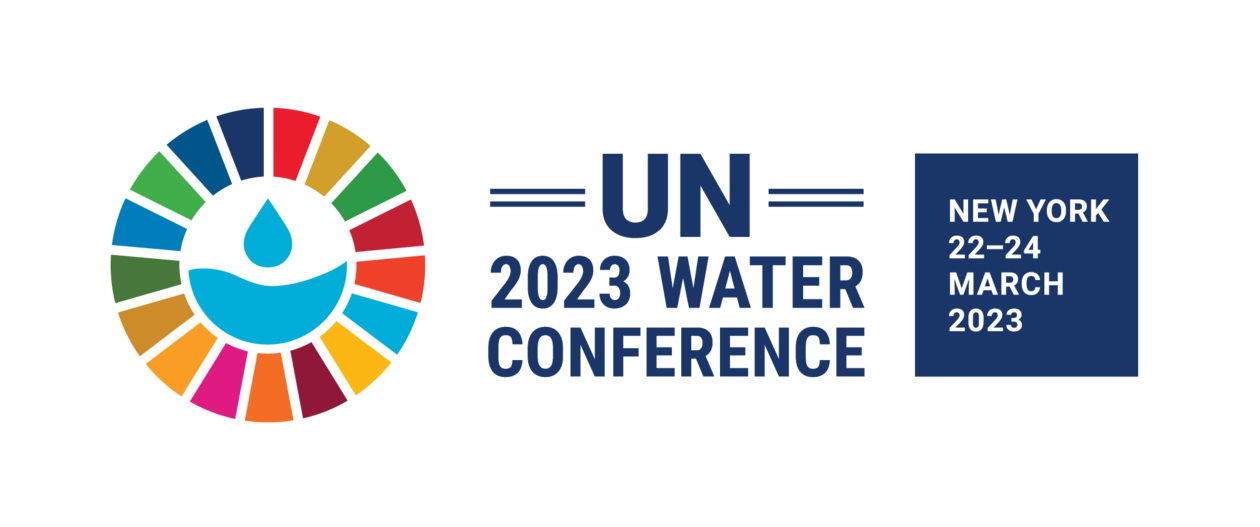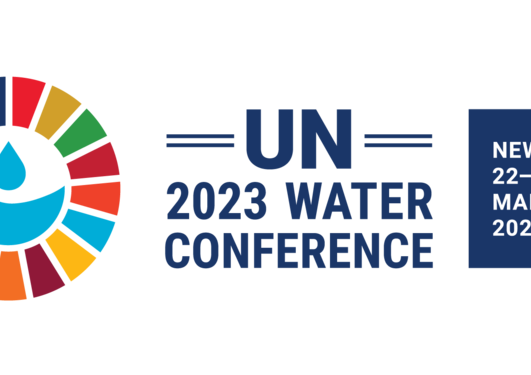Taking water insecurity to policy makers
Water insecurity in all its shape and forms was the key topic when the four frontlines of water were discussed at the side event organised by the University of Bergen and partners at the UN 2023 Water Conference.

Main content
The University of Bergen side event “Our Water World: on the frontlines of water access and governance” at the UN 2023 Water Conference (UNWC23) proved so popular people had to be turned away at the doors. In the conference room with a capacity of a 60 plus audience around 90 people packed into the room to listen to an exciting line up of speakers and respondents from five continents, with moderator Edvard Hviding setting up a bold trajectory on the four key frontlines of water insecurity from the first minute of the event. UiB’s side event was chosen among 1,300 proposals as one of 200 side events inside United Nations Headquarters.
Huge gap between needs and decisions
Programme Manager Omar Hernández from side event co-organiser United Nations Academic Impact (UNAI) welcomed the audience both to the side event and the UN Building, which is his daily workplace, when speaking of transboundary collaborations.
“When we design, implement, and review policy, we must remember that water is a common good and resource. Let us remember those who we are speaking on behalf of. Remember those who are marginalised and excluded from processes. There is a huge gap between decisions and the needs of those affected by water related issues. Universities and higher education can make a difference. The time to theorize about the SDGs, that time has passed and is long behind us,” said Hernández, “this is a time to rethink the way we do things. SDG17 is the key to solve all the SDGs by 2030. An opportunity to exchange ideas to work towards the common good.”
From abundance to water insecurity
The first speaker in an exciting panel was Palau’s UN Ambassador Ilana Seid, who is also the current Chair of the Pacific Small Island Developing States (PSIDS) at the UN.
“In the Pacific we believed there was water in abundance, but a look at the SDG6 targets shows that this is not the case. There is quite a bit of water insecurity in our region. Only half have access to clean water and two thirds don’t have access to basic sanitation,” said Ambassador Seid when kicking off the side event.
“Saltwater intrusion leads to non-consistent water supply in atoll island nations. In some countries local staple crop can no longer be cultivated. We experience a cycle of drought and excess rainfall. You see that not only in the Pacific but in all parts of the world, such as in California. In Palau a few years ago we had a severe drought, where we basically ran out of all our water and had to import a desalination facility,” said the Palau ambassador and went on:
“We need to build infrastructure that is more climate resilient. Planning of thought that needs to plan. Start designing systems for harvest and storage. Larger donor countries like to come with large complex solutions. But we found that working with local communities and find their local communities, using their local knowledge. They have cracked the solution for centuries and if we take some of the feedback from them, that may go a long way for solving water insecurity. This needs also to be tailored to climate change.”
Seeing more north-south knowledge exchange
Next up was Executive Director Kala Vairavamoorthy from the International Water Association (IWA), who looked at the challenges of poor water management taking a more overall view of water insecurity.
“We all talk about climate change but one of the big problems we have in the global south is urbanisation. Every week cities are adding 850,000 people. But in the south, big cities don’t have good service provisions. At the same time, their living standard is rising, so you have an increase in use of water and the utilisation of water is also rising,” said the IWA Director.
“A good sign is seeing much more north-south knowledge exchange happening. We are now thinking more about the productive use of water. What quantity and quality of water do we need for this or that. There are shifts away from using high grade drinking water for all needs,” Vairavamoorthy said.
“Clean water should be available for all independently on the geography, resources, wealth of a nation, but today it is much polarised,” he said and continued, “water has become a commodity, but it is also a life-important product – thus the access to it cannot be dependent on the wealth of a nation. It is and shall be a common good.”
Kala Vairavamoorthy said that “Leaving no one behind” is an objective which IWA shares with its members from over 140 countries, mobilising academics, utility professionals, and industries: “Each resource person and resource organisation should contribute with what they can. IWA encourages all to join in sharing of good practices.”
The key role of transboundary river basins
“Large rivers are critically important for SDG6. Most large rivers flow through several countries and when they are within a country may cover a good part of the area and population,” said Professor Harsha Ratnaweerafrom the Norwegian University of Life Sciences at the UNWC23 side event.
“There are almost 300 transboundary river basins in the world. Transboundary waters account for 60 per cent of the world’s freshwater flows and they flow through 150 countries. About 90 per cent of all rivers and lakes in Africa are transboundary. Over 40 per cent of the world’s population lives in these river basins,” he said.
Executive Director Elisabeta Poçi from the Water Supply and Sewerage Association of Albania shared her observations from a national level in Albania. Highlighting two challenges: 1) Providing universal access to services, in particular in rural areas; 2) Water and sewerage facilities are not always financially sustainable.
Water Frontline Reflections
In his enthusiastic Water Frontline Reflections archaeologist and water expert Dr. Tore Sætersdal from the University of Bergen brought together the four water frontlines and picked up on what Professor Ratnaweera said about the key role of science and higher education in bringing about #SDG6: Clean water and sanitation for all.
Dr Sætersdal also reminded the audience that water is a local issue as well as global, but its impact is felt locally: “Universities and academic institutions are part of both global and local life. Our institutions can connect the two and facilitate contact between different stakeholders,” he said.
The archaeologist is also the principal investigator in the project Water ESSENCE Africa, funded by (Norad), which has been registered as Water Action Agenda (WAA) commitment #SDGAction50451.
After the panel debate and the Water Frontline Reflections, a lively Q&A session ensued with a mix of questions, comments and enquiries highlighting several water insecurity issues.
The University of Bergen would like to thank our co-organisers for helping us make this amazing side event possible!
- Check out the (water) action: #WaterAction #UNWC23 #SDG6 #OurWaterWorld

